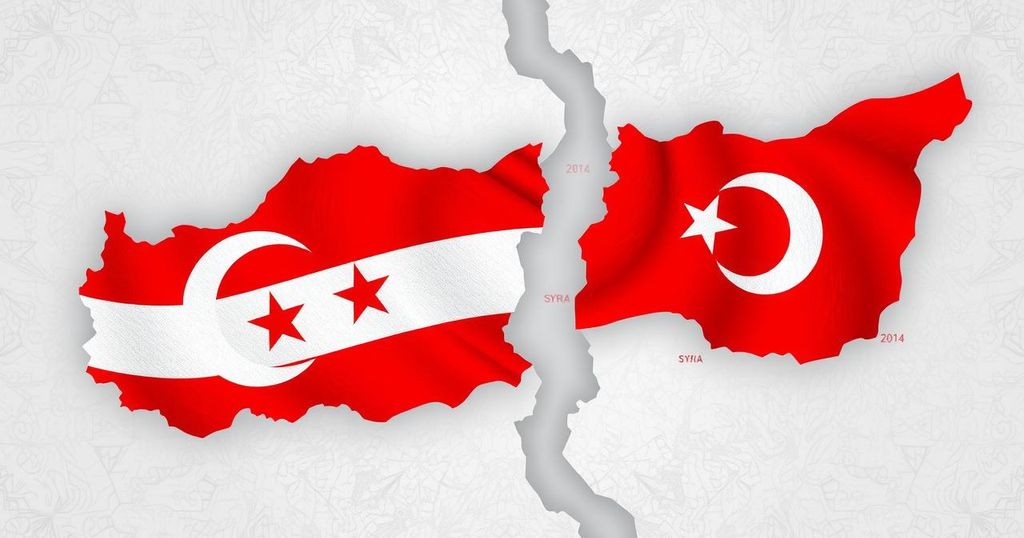Turkey’s Search for a Strategic Resolution in the Syrian Conflict
Turkey is reassessing its approach to the Syrian conflict amidst military stalemate and pressures from Russia and the U.S. Efforts include engaging with both the Assad regime and the PKK, aiming to reshape its Kurdish policy. The complexities of regional dynamics, particularly the prospects of a U.S.-backed Kurdish state, further underscore Turkey’s strategic recalibrations in search of a resolution.
Turkey’s strategy within the Syrian conflict has reached a pivotal point, characterized by military stalemate and significant geopolitical pressures from both Russia and the United States. As Ankara contemplates altering its approach, particularly regarding its Kurdish policy, it is engaging in political overtures aimed at resolving the conflict. These efforts include potential conversations with President Bashar al-Assad and considerations concerning Abdullah Ocalan, the imprisoned leader of the Kurdistan Workers’ Party (PKK).
Since 2015, Turkey has prioritized securing its borders from the YPG forces affiliated with the US-backed Syrian Democratic Forces (SDF). Despite several military operations to establish a Kurdish-free zone, Russian intervention and American opposition have thwarted Turkey’s objectives. Recent weeks have seen Russian reinforcement in Syria in response to Turkey’s military intentions, further complicating Ankara’s position. The United States continues to oppose Turkish military action in the region, enhancing Turkey’s apprehension regarding sanctions due to its fragile economy.
Turkey’s earlier dialogue attempts with Syria yielded minimal success, with President Erdogan’s renewed interest in conversations with Assad illustrating a shift in strategy. Recognizing the necessity for cooperation to address mutual security threats, Turkey is poised to negotiate despite the inherent challenges, chiefly Assad’s divergent aims. The specter of a US-supported Kurdish state looms large in Turkey’s considerations, compounded by fears of broader regional conflicts involving Israel and Iran.
Developments in Turkey’s approach towards the Kurdish question have gained momentum, particularly after a proposal by Devlet Bahceli, leader of the Nationalist Movement Party, suggesting Ocalan could address the Turkish parliament if he calls for an end to PKK’s armed resistance. This proposal could serve as leverage in Turkey’s quest for resolution in Syria, notwithstanding the significant political obstacles that lay ahead. The recent spike in violence between the PKK and Turkish forces further complicates these diplomatic efforts.
The US-Turkey relationship may benefit from synchronized efforts to untangle the complexities surrounding Syria. Both nations share an interest in regional stability, yet the United States must exercise caution to avoid appearing overly involved in Turkey’s negotiations with the PKK, as this may result in detrimental consequences for bilateral relations. As the situation develops, it remains uncertain how effective Turkey’s new initiatives will be in achieving constructive engagement with both Syrian authorities and Kurdish representatives.
Turkey’s involvement in the Syrian civil conflict has been shaped by longstanding security concerns regarding the PKK and its affiliates, notably the YPG. Since the onset of the Syrian crisis, Turkey has sought to establish a buffer zone along its border to prevent the formation of a Kurdish entity that could incite similar separatist sentiments at home. Tensions with Russia and the United States have further complicated Ankara’s strategic calculations, forcing Turkey to reconsider its military-focused approach. The fluctuating dynamics within the region, especially Israel’s role and potential Kurdish gains, underscore Turkey’s urgency to seek a multifaceted resolution in cooperation with both local actors and global powers.
Turkey’s search for a viable resolution to the Syria conflict reflects a strategic pivot amidst complex geopolitical pressures. As Ankara grapples with military pressures from both Russia and the United States, it is exploring potential dialogue with Syrian authorities and making overtures regarding its Kurdish policy. While efforts to engage with both Assad and Ocalan signify a willingness to adapt, significant challenges remain that could impede progress. The evolving situation necessitates careful navigation by Turkey, especially in the context of its relationships with global powers and regional dynamics.
Original Source: www.atlanticcouncil.org




Post Comment